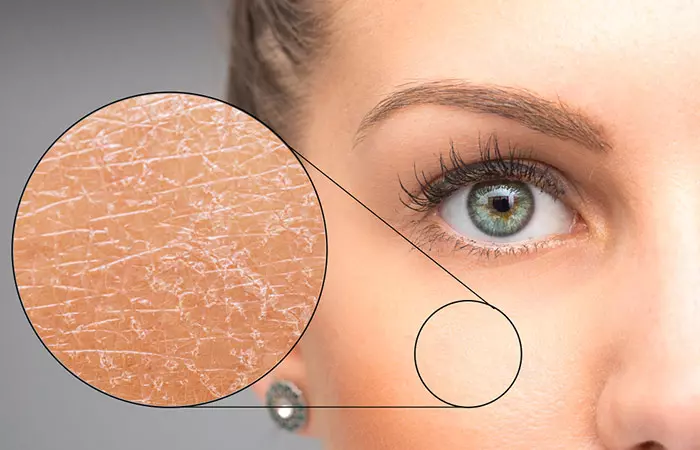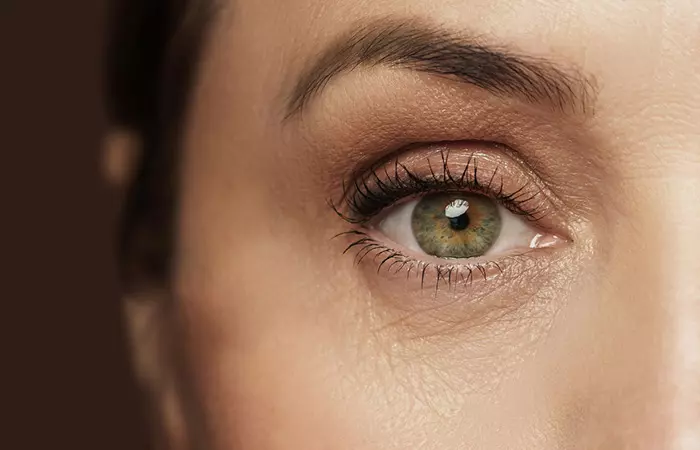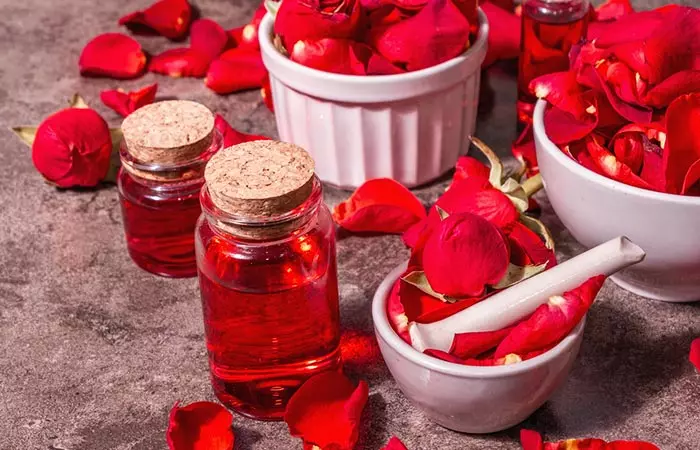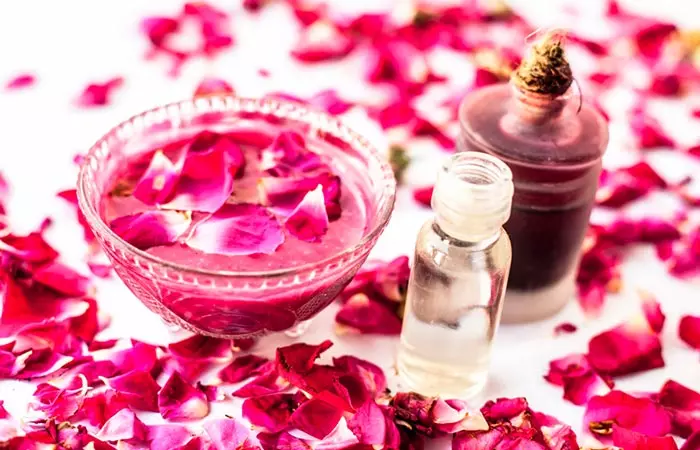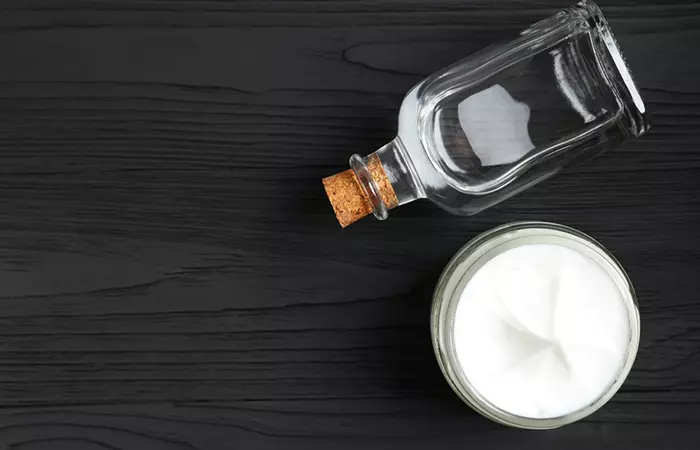Scroll down and find out how to use rose water and glycerin for your face and skin.As already mentioned, glycerin is a humectant, which means it attracts moisture from the atmosphere and binds it to your skin and prevents dryness (2). Areeba, a blogger, describes in one of her blogs her experience of using rosewater and glycerin in her skin care routine: “I have been using this recipe for soft skin for more than a year now. I first came across this two years back and to be honest with you guys, I was not as much interested at first to try it out. Not because I thought it would react on my skin in any way but for the fact that glycerin is of a sticky consistency and I never tend to like that kind of products. Nevertheless, I tried it just to know what was all the craze about! Not that I expected it to show results in a single night, I noticed softer skin the first morning and VOILA… I have been using it since then! (i).”
Glycerin And Rosewater: What Are The Benefits?
The combination of rosewater and glycerin is good for your face. These two ingredients have several benefits. Let’s look at each ingredient in detail.
Glycerin can help your skin in many ways:
1. It May Protect The Skin Barrier
Glycerin is a humectant that keeps your skin moisturized. The transepidermal water loss or TEWL (loss of water from your body through the epidermis) is a factor that reflects the normal function of your skin’s barrier. A mice study showed that regular application of glycerin might prevent TEWL and keep the skin hydrated and the skin barrier intact (1).
2. It Prevents Skin Dryness
If you have dry and dehydrated skin and issues like atopic dermatitisi A chronic inflammatory skin condition causing dry, red rash-like lesions on the face, hands, and other skin folds. , your skin will love glycerin. A study conducted in the U.S. revealed that around 31.8% of the adult population suffer from atopic dermatitis. Further, it stated that the percentage of eczema was reported to be higher in women at 8.9% compared with men at 5.7%. Further, the study also stated that Hispanic adults were more likely to have atopic dermatitis than non-Hispanic whites. As already mentioned, glycerin is a humectant, which means it attracts moisture from the atmosphere and binds it to your skin and prevents dryness (2).
3. It Improves Skin Permeability
Human skin has a low permeability. This means it is tough for foreign substances to penetrate the skin layers. This is why certain skincare products do not work for you. Glycerol (commercially known as glycerin) can help improve the skin’s permeability (3). Rosewater has the following skin benefits:
4. It Is Good For Sensitive And Aging Skin
If you have dry and aging skin that is sensitive to products, rosewater can help keep it healthy. It has anti-aging benefits, and when applied topically, it has an astringent effect on your skin. It soothes the capillaries right beneath your skin layer and prevents redness (4).
5. It Has Anti-inflammatory Effects
Rose flowers contain tanninsi Beneficial compounds naturally found in plants possessing strong anti-inflammatory, antibacterial, and antioxidant properties. , anthocyaninsi A group of pigments that give fruits and vegetables their characteristic purple, red, or blue hues. , and essential oils. Rose extracts have anti-inflammatory properties and also protect the fibroblast cells (cells responsible for collagen synthesis) from damage (5).
6. It Calms The Skin
There is no denying that applying rosewater on the skin has a calming and soothing effect. The floral essence has a hydrating effect on your skin and is exceptionally beneficial in rejuvenating your tired skin at the end of the day and soothing sun damage.
7. It May Soothe Eczema Symptoms
Rose extract has anti-inflammatory characteristics. It can effectively address various conditions, whether they are internal or external, and potentially provide relief from the discomfort associated with skin conditions like eczema or rosacea (5). A mommy blogger shared an experience using rosewater to soothe her daughter’s skin rash. She learned about this remedy from a friend who found success with rosewater in soothing skin rashes for their own children. She said in her blog, “I took it home and that night applied it gently over the rash that was on her arm. After about a week, the rash was gone (ii).”
8. It Minimizes Pimple Marks
Rosewater can be a helpful natural remedy for reducing the appearance of pimple marks. Research indicates that rose water is abundant in vitamin C and phenolic compounds. Furthermore, the study found that rosewater’s antiseptic and antibacterial characteristics may expedite the healing process for cuts, burns, and scars (6). Therefore, it might also help heal inflamed acne or pimples and minimize the risk of developing spots. By gently applying rosewater to the affected areas, you can potentially improve the texture and tone of your skin over time. While it may not provide instant results, consistent use can contribute to a healthier skin tone. A blogger shared her experience with rosewater and glycerin, highlighting the benefits. She found this natural and inexpensive combination to be a highly effective and pleasant moisturizer for their skin, free from harsh chemicals and leaving a light, non-oily feel. She said, “And it’s worth every penny! It is everything it’s supposed to be. Moisturizing without being oily, nice smelling, non-comedogenic (iii).” Commercially available rosewater may contain other chemicals, which may not give you the same benefits as homemade rose water (that has pure rose extracts). Now that you know what these two ingredients can do to your skin, let’s check out how you can use glycerin and rose water for your face.
How To Use Glycerin And Rosewater For The Face
Note: Avoid using glycerin directly on your skin. Always mix it with rosewater to dilute it before using it. If used directly, in some cases, glycerin may also make the skin dry. For effective results, learning how to use glycerin on the face properly is crucial to achieving balanced and hydrated skin.
1. Rosewater And Glycerin Toner
4 tablespoons rose water 2 teaspoons glycerin Airtight spray bottle
2. Rosewater And Glycerin Makeup Setting Spray
4 tablespoons glycerin 6 tablespoons rose water 2 tablespoons witch hazel ½ teaspoon tea tree oil (optional) Spray bottle
How It Helps Witch hazel has astringent and antibacterial properties that can help in soothing your skin and alleviate acne and inflammation (5). Tea tree oil not only protects your skin from bacteria, viruses, and mites but also offers a cooling sensation (7).
3. Rosewater And Glycerin Facial Cleanser
1 ½ cups rose water 2 tablespoons unscented Castile soapi A toxin-free soap rich in olive oil that is used as a vegan alternative to soaps made from animal fats. 1 tablespoon glycerin 1 tablespoon vitamin E oil 1 airtight glass jar
How It Helps Castille soap is mild on your skin and can help prevent acne. Vitamin E protects the skin from free radical damage and helps delay aging and fade dark circles under the eyes (8).
4. Rosewater And Glycerine Facial Mask
1 tablespoon glycerin 1 tablespoon rose water 2-3 drops serum (pick your favorite) 1 disposable cotton sheet mask
How It Helps A serum can help treat a variety of skin conditions, such as acne, dryness, pigmentation, and wrinkles (9).
5. Rosewater And Glycerin Moisturizer
1 tablespoon glycerin 4 tablespoons rose water Glass dropper bottle
6. Rosewater And Glycerin Serum
2 tablespoons glycerin 1 tablespoon rose water (organic) 2 tablespoons aloe vera gel ½ tablespoon argan oil 5 drops geranium essential oil 1 glass dropper bottle 1 funnel
How It Helps Aloe vera gel protects the skin from UV damage, moisturizes it, increases skin elasticity, and delays the formation of wrinkles (10). Argan oil improves skin elasticity and skin hydration and makes the skin soft (11). A geranium essential oil can help treat acne, balance sebum production, and delay aging (12).
7. Rosewater And Glycerin Face Mist
¼ cup rosewater 2 tablespoons glycerin ¼ cup distilled water Spray bottle
8. Rosewater, Glycerin, And Lemon Toner for Skin
1/2 cup of rosewater 5 drops of glycerin Juice of half a lemon
Lemon is rich in vitamin C that acts as an astringent and lightens your skin tone (13). Combining them creates a toner that hydrates and brightens the skin, enhancing its overall appearance. While this is just one way to use the ingredients for your face, you can also use glycerin with rose water and lemon juice in many other ways. Note: Never use undiluted lemon juice on the skin. Also, lemon juice makes the skin photosensitivei A substance that reacts to light which, when applied topically, makes skin prone to redness and rashes upon sun exposure. , so apply sunscreen before sun exposure. Both the ingredients are harmless to the skin. However, if you are allergic to them, it is better to avoid them. Here are a few tips to consider before using these DIY remedies.
Tips To Consider While Using Glycerin And Rose Water For The Face
Side Effects of Glycerin And Rose Water
Both the ingredients are considered safe for the skin. However, you could be allergic to either of the ingredients or both. If you are sensitive or allergic to the ingredients, you may experience the following side effects:
Redness Itching Rashes Burning sensation Stinging sensation Swelling
If you experience any of these symptoms or any other symptoms and changes in your skin, stop using the product immediately, and consult a doctor. Is it safe for all skin types? Yes, glycerin is generally considered safe for most skin types including sensitive skin, as it is a humectant that helps lock in moisture and may soothe irritation. However, it is always best to do a patch test first to ensure your skin does not react negatively. Does glycerin darken the skin? Answer: No, it doesn’t. Can glycerin and rosewater mixture be applied overnight? Answer: Yes, if it suits your skin. Is rose water and glycerin good for lips? Yes. According to anecdotal evidence, a rose water and glycerin mixture can help reduce hyperpigmentation and soothe and hydrate your lips. Rose water’s anti-inflammatory properties may help reduce any irritation. Can glycerine remove pimples? Possibly. Glycerine is a gentle skin care ingredient that may help exfoliate and soothe inflammation. It may also help remove dirt and impurities from your face, thereby preventing pimple formation. Rose water and glycerin are great for oily skin to keep it fresh and bright. Find out more about these natural ingredient hacks in the video below.
